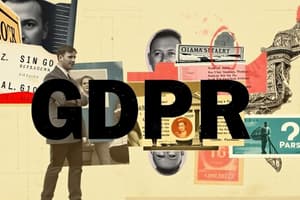Podcast
Questions and Answers
What right allows individuals to transfer their personal data to another organization?
What right allows individuals to transfer their personal data to another organization?
- Right to object
- Right to data portability (correct)
- Right to lodge a complaint
- Right to restriction of processing
Which of the following best describes a consequence of non-compliance with GDPR?
Which of the following best describes a consequence of non-compliance with GDPR?
- Significant fines imposed by supervisory authorities (correct)
- Reduced operational costs
- Increased customer loyalty
- Enhanced reputation among stakeholders
What does GDPR require organizations to implement to protect personal data?
What does GDPR require organizations to implement to protect personal data?
- High level of data security measures (correct)
- Minimum technical measures
- Only verbal agreements on data handling
- No specific security requirements
Which right allows individuals to complain if they believe their data rights have been violated?
Which right allows individuals to complain if they believe their data rights have been violated?
Who does GDPR apply to?
Who does GDPR apply to?
What is the primary aim of the General Data Protection Regulation (GDPR)?
What is the primary aim of the General Data Protection Regulation (GDPR)?
Which of the following best describes the scope of GDPR?
Which of the following best describes the scope of GDPR?
Which principle of GDPR requires that data should only be collected for specified and legitimate purposes?
Which principle of GDPR requires that data should only be collected for specified and legitimate purposes?
What does the principle of data minimization in GDPR entail?
What does the principle of data minimization in GDPR entail?
Under GDPR, what right allows individuals to request the deletion of their personal data?
Under GDPR, what right allows individuals to request the deletion of their personal data?
Which concept in GDPR refers to an organization that determines the purposes and means of processing personal data?
Which concept in GDPR refers to an organization that determines the purposes and means of processing personal data?
What is required of organizations to comply with the accountability principle of GDPR?
What is required of organizations to comply with the accountability principle of GDPR?
Which right under GDPR allows individuals to request corrections to inaccurate data?
Which right under GDPR allows individuals to request corrections to inaccurate data?
Flashcards
Right to Restriction of Processing
Right to Restriction of Processing
Individuals have the right to ask an organization to limit how they use their personal information. This applies in situations like when the data is inaccurate, or if the processing is unlawful.
Right to Data Portability
Right to Data Portability
Individuals can request a copy of their personal data in a commonly used format. They can then transfer this data to another organization.
Right to Object
Right to Object
Individuals can object to the processing of their personal data in certain situations, such as when the processing is for direct marketing purposes.
Right to Lodge a Complaint
Right to Lodge a Complaint
Signup and view all the flashcards
Data Security under GDPR
Data Security under GDPR
Signup and view all the flashcards
What is the GDPR?
What is the GDPR?
Signup and view all the flashcards
Who does the GDPR apply to?
Who does the GDPR apply to?
Signup and view all the flashcards
What is the key objective of GDPR?
What is the key objective of GDPR?
Signup and view all the flashcards
What is the principle of lawfulness, fairness, and transparency?
What is the principle of lawfulness, fairness, and transparency?
Signup and view all the flashcards
What is the principle of purpose limitation?
What is the principle of purpose limitation?
Signup and view all the flashcards
What is the principle of data minimization?
What is the principle of data minimization?
Signup and view all the flashcards
What is the right to access?
What is the right to access?
Signup and view all the flashcards
What is the right to rectification?
What is the right to rectification?
Signup and view all the flashcards
Study Notes
Overview of GDPR
- The General Data Protection Regulation (GDPR) is a European Union regulation aiming to strengthen and unify data protection for individuals within the European Economic Area (EEA).
- It creates a comprehensive framework for handling personal data, outlining individual rights and organizational responsibilities.
- GDPR applies to any organization globally processing personal data of EU residents.
- Ensuring individual control and understanding of how their personal data is used is a core principle of GDPR.
Scope of GDPR
- GDPR applies to organizations processing EU citizen data, regardless of location.
- This includes processing in or outside the EEA where it concerns offering goods/services to or monitoring behavior of EEA individuals.
- Special categories of personal data (e.g., health, genetic) are subject to heightened safeguards.
- GDPR clearly defines “controller” and “processor” roles.
Principles of GDPR
- Lawfulness, fairness, and transparency: Data processing must be legal, fair, and transparent, informing individuals about data collection/usage.
- Purpose limitation: Data collection must have specified, explicit, and legitimate purposes; it cannot be used for other purposes unless compatible.
- Data minimization: Only the necessary personal data should be collected and retained for stated purposes.
- Accuracy: Data must be accurate and kept up-to-date.
- Storage limitation: Data must be securely stored only for the required period.
- Integrity and confidentiality: Data must be processed securely, maintaining integrity and confidentiality.
- Accountability: Organizations must be able to demonstrate compliance with GDPR principles.
Key Rights of Individuals Under GDPR
- Right to access: Individuals can request information about their data processing.
- Right to rectification: Individuals can correct inaccurate or incomplete data.
- Right to erasure ("right to be forgotten"): Data can be deleted under specific circumstances.
- Right to restriction of processing: Data processing can be restricted under certain conditions.
- Right to data portability: Individuals can obtain and transfer their data to another organization.
- Right to object: Individuals can object to certain data processing (e.g., direct marketing).
- Right to lodge a complaint: Individuals can report violations to supervisory authorities.
Consequences of Non-Compliance
- Supervisory authorities can impose significant fines for GDPR breaches.
- These substantial fines incentivize compliance.
- Non-compliance can damage reputation and erode trust.
- Enforcement actions can disrupt business operations.
Data Security
- GDPR necessitates a high standard of data security.
- Organizations must employ appropriate technical and organizational measures to protect personal data from unauthorized or unlawful processing.
- Measures should include identifying, preventing, and mitigating data breaches.
International Considerations
- GDPR applies to organizations processing EU-based individuals' data, regardless of the organization's location.
- Cross-border data transfers require careful consideration and adequate safeguards.
Conclusion
- GDPR is a comprehensive data protection regulation requiring business adherence.
- Understanding its principles, rights, and obligations is crucial for business operations.
- Organizations must take proactive measures to maintain ongoing GDPR compliance.
Studying That Suits You
Use AI to generate personalized quizzes and flashcards to suit your learning preferences.





